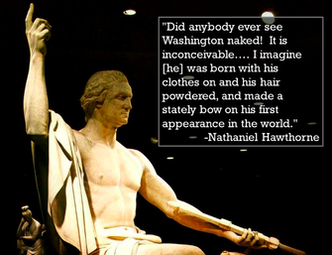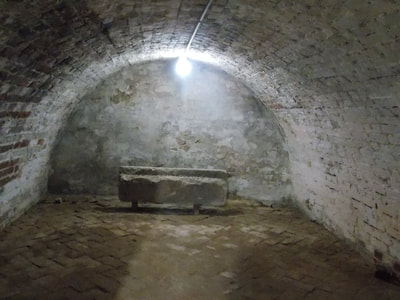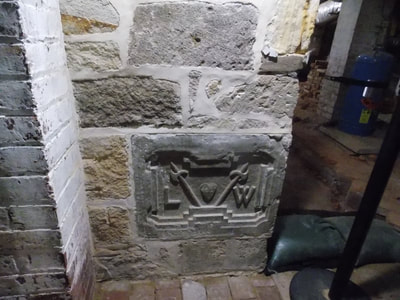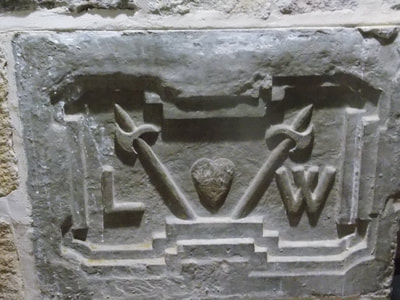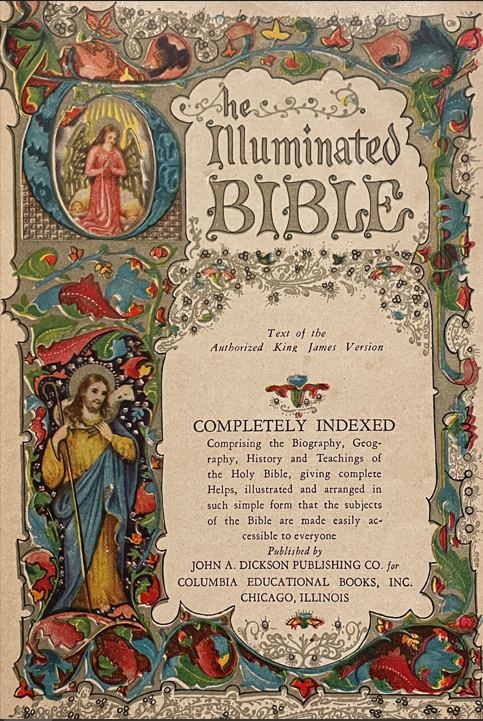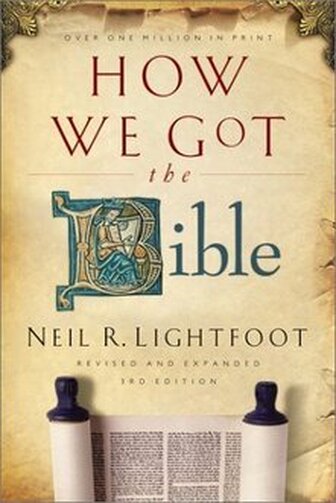beginning at 7:00 pm on Wednesdays.
at the church of Christ in Carthage, Missouri, south of the Ford dealership
PLEASE JOIN US!
|
In the education business, we call this bell work. As we enter the classroom, work on this packet of material to get you into the mindset for this lesson.
|
|
||
We contend that the Bible and everything it contains is supported by:
|
|
|
Mount Vernon: Restoration, Authenticity, and Simplicity
|
Consider Nathaniel Hawthorne's quote (below).
Greenhouse
When Harry S Truman occupied the White House in the 1940s, a piano leg broke through the floor and nearly plunged into the level below. Truman subsequently had the president's house gutted and rebuilt on the inside. When he did, much of the history of the place was exposed, including the charred remains of the British siege of the structure during the War of 1812.
Many colonial bricks were also cleared out and were no longer needed for the rebuilding of the interior. Those bricks were offered the the Ladies of Mount Vernon - in case they had any use for them. The ladies quickly approved the acquisition, knowing an excellent use for the bricks. These would help them the closest they could possibly come to recreating another project on the property - the greenhouse. It is suspected that Washington family member, Bushrod Washington, in the years following George's death, may have burned the greenhouse on purpose in order to receive an insurance payout. The ladies had dreamed of rebuilding the structure for a while, and the offering of actual slave-made bricks was as close as they could ever dream of making the building historically accurate. The restoration (pictured below) would be as close to spec as possible.
The Necessary
One of the places I didn't want to miss in my stay on the property was the Necessary (fancy term for the outhouse/restroom). This was the one item that would humanize George Washington more than any other and take me away from that Hawthorne we began with above. The Necessary is, strangely, a three-holer, and aptly for this lesson, it was being restored. I'll be able to tell you more about it in person.
|
The Ladies of Mount Vernon Association is the governing body that owns George Washington's mansion in Virginia. Their mission includes restoration, respect, relevancy. They are dedicated to the accurate preservation of the house and the grounds upon which it rests, there on the banks of the Potomac River. In many ways, the accuracy of their preservation is impressive, focusing on getting the methods and materials to match the period of time when the General and Lady Washington occupied this property in the 18th Century.
Rustication
One such demonstration of the period restoration can be found in the repainting of the outside walls of the mansion itself. While these walls appear to be constructed of cut stone, the fact remains that they are wooden, treated with a particular painting method to deceive the observer into thinking the house is much more impressive than it really is.
When I stayed on the property for a week, I learned more about this process. See how I encountered Mount Vernon first hand, then watch the short video below to learn how those walls are restored right down to the accurate coloring.
The Mansion Cellar
A trip into the dark cellar of the mansion reveals original foundations (as well as electric wiring strung by none other than Thomas Edison, to aid tourists in their visits many years following the deaths of George and Martha).
One cornerstone in the basement is familiar to fans of the National Treasure movie franchise. In the sequel movie, the stone is said to be the mark of George Washington, even though is sports the letters L and W, representing the initials of George's older half brother, Lawrence. The truth is, the movie makers remade the stone, replacing the letter L with a G, to make the lines make more sense. When the Ladies of Mount Vernon screened the movie, they despised the change. "If you're going to use our things, you're going to portray them accurately," they told the producers, prompting the props department to remake the stone and the rest of the company to reshoot the scene when Ben Gates kidnaps the president of the United States.
Are you catching that recurring theme of restoration in these examples. If only folks would put as much energy into restoring the First Century church! The point, for the purpose of this lesson, is that we also hope for the most accurate restoration of Scriptures. We addressed this in previous lessons, but it is appropriate for us to stress it again as we consider the canon of the Bible.
|
"The Truth Shall Set You Free"
"If God has the ability to make His will understandable, but chose not to do so, then He leaves sinful man in a helpless and hopeless condition. However, the Bible assures us that Almighty God wants all men to be saved (2 Peter 3:9; 1 Timothy 2:3f). Therefore we can be sure that, as its Author, God intends the Bible to be understood."
Some contend that an individual must be a Greek and Hebrew scholar to understand how God wants him or her to live, when really, all one needs to do is read and study from the text itself. The Bible itself verifies that we can understand all that God requires for salvation.
Jesus prays in John 17:17, "Sanctify them through thy truth." Thy Word is Truth, which teaches that people are set apart, or sanctified, through the word of God. How can one be sanctified through the word of God if he or she can’t understand it?
In John 17:20f, Jesus prays, "I do not ask in behalf of these alone, but for those also who believe in Me through their word; that they may all be one; even as Thou, Father, art in Me, and I in Thee, that they also may be in Us; that the world may believe that Thou didst send Me. In other words, He prayed that all would become Christians through hearing, believing, understanding, and obeying the truth which the apostles would speak, as revealed to them by the Spirit of truth" (John 14:26; 16:13).
The Bible affirms that the gospel is to be preached to every creature and that each hearer who believes and is baptized will be saved (Mark 16:15f), but how can one respond to the gospel by believing and being baptized if he or she can’t understand the gospel?
First Timothy 2:4 notes that God desires all men to be saved and to come to the knowledge of the truth. The implication is that if God wants all to know the truth, then one must have the capability to understand the truth.
Jesus resists the temptation of Satan in the wilderness by declaring that man shall not live on bread alone, but on every word that proceeds out of the mouth of God (Matthew 4:4). If we are to live by the words of God, we obviously must be able to understand the words of God.
At the close of his account of the gospel, John wrote these words: "Many other signs therefore Jesus also performed in the presence of the disciples, which are not written in this book; but these have been written that you may believe that Jesus is the Christ, the Son of God; and that believing you may have life in His name" (John 20:30f). Here is further proof the Bible is understandable. If faith is produced by the accounts of His signs and wonders, the ability to understand the accounts is inferred.
Further, Christians are instructed to keep your eye on those who cause dissensions and hindrances contrary to the teaching which you learned, and turn away from them. Obeying this command requires knowledge and comprehension of the Word of God.
The apostle Paul writes Timothy that "All Scripture is inspired by God and profitable for teaching, for reproof, for correction, for training in righteousness; that the man of God may be adequate, equipped for every good work." Scripture could not completely equip us if we can’t understand it.
"One of the most powerful affirmations of the ability to understand the Bible," says Sain, is found in Ephesians 3:3f. "There, Paul writes, that by revelation there was made known to me the mystery, as I wrote before in brief. And by referring to this, when you read you can understand my insight into the mystery of Christ."
Our Canon of Scripture
What do we mean when we refer to the canon of Scripture? Our discussion using the anchor text is below, but first, let's see how an older text describes the subject (which does not require black powder or projectiles).
The Illuminated Bible, published Dickson Publishing Company for Columbia Educational Books (1941) has some interesting features and artwork. In the introductory material to this edition are the following words regarding the canonicity of our 66-book Library: |
The Greek word canon signifies a straight rod or rule. When used figuratively it means that by which anything is tested as a rule, such as a test or rule of logic. It is used in Gal. 6:16; Phil. 3:16 as a "rule of life," and in 2 Cor. 10:13, 16 as a measure of excellence. In 380 A.D., it was first applied to the Scriptures, and from the time of Origen it has been applied to the books comprising the Bible which are regarded as having Divine authority. Thus we speak of the Canon of Scripture, while uncanonical books are those that are not in the Canon. The Apocryphal books belong to this class, all the evidence pointing to the fact that they were not inspired, have not Divine authority and are not a part of the Scriptures as a "rule of faith." In matters of religion and ethics the Bible is the standard, the rule or Canon by which these are judged...
...By Genuineness and Authority of the Scriptures is meant that they are the actual writings that have come down to us, and that these writings have been unaltered.
|
Finally, let's explore Chapter 14 of our anchor text, How We Got the Bible by Neil Lightfoot. In this chapter, Mr. Lightfoot provides rationale for the acceptance of the canon of our English Bible. He also offers the following questions for us to discuss in class:
|
Red Letters

But we also recognize that the red letters are not the only inspired authoritative text that we have. While some would have us segregate the Words of Christ from the black letters in our Bibles, and while it may be tempting and less challenging to only want to read the Words of Christ, the red letters are not the only inspired text, and we must not limit the official canon to contain only the red letters.
The truth is that the authority of Christ was given and delegated to the apostles, who along with a couple of others were guided directly by the Holy Spirit. Jesus tells them in John 14:16f, “I will ask the Father, and He will give you another Helper, so that He may be with you forever; the Helper is the Spirit of truth, whom the world cannot receive, because it does not see Him or know Him; but you know Him because He remains with you and will be in you.”
He also says, in John 16:7-15, “But I tell you the truth: it is to your advantage that I am leaving; for if I do not leave, the Helper will not come to you; but if I go, I will send Him to you. And He, when He comes, will convict the world regarding sin, and righteousness, and judgment: regarding sin, because they do not believe in Me; and regarding righteousness, because I am going to the Father and you no longer are going to see Me; and regarding judgment, because the ruler of this world has been judged.
“I have many more things to say to you, but you cannot bear them at the present time. But when He, the Spirit of truth, comes, He will guide you into all the truth; for He will not speak on His own, but whatever He hears, He will speak; and He will disclose to you what is to come. He will glorify Me, for He will take from Mine and will disclose it to you. All things that the Father has are Mine; this is why I said that He takes from Mine and will disclose it to you.”
Paul, not among the original 12, writes in Galatians 1:11f, “For I would have you know, brothers and sisters, that the gospel which was preached by me is not of human invention. For I neither received it from man, nor was I taught it, but I received it through a revelation of Jesus Christ.”
At present, “The underlying reason for most likely holding to this ‘red letters [only]’ position is to strip away the strict teachings on the roles of men and women in the spiritual life of the church and the home, …the sinfulness of homosexuality, …and laws about marriage, divorce and remarriage.” That bold and true statement is from David Fanning and Shane Fisher in an issue of The Voice of Truth International.
We have to recognize that the authority of Jesus is what makes the authority of the Bible so effective as defense against temptation and offense against struggle. The Bible, in its entirety, does so much for us - but only when we take it as prescribed.
Our focus for this study hinges on answering these two big questions. The goal is to get closer to the answers each week in our class.
Is the Bible accurate and dependable?
So how important is it to you that the Bible can be proven true? Do you believe there is irrefutable evidence to its validity? Is proof something that strengthens your personal faith in the existence of God?
Should faith alone be enough to drive you to drive you to your knees? Is "blind" faith a stronger kind of faith? If so, then why did God provide so much evidence?


